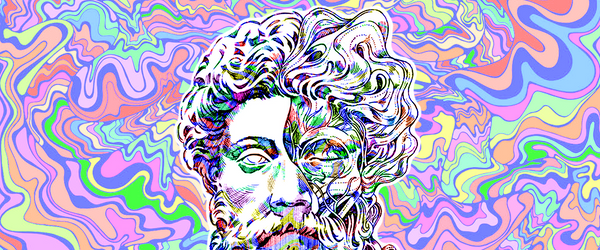Andy Dilks • • 5 min read
Challenging Cocky Certainty: Why I Am No Longer An Atheist

British comedian Ricky Gervais recently summed up one of the mistakes made by atheists when he tweeted the following message: “I think people hate atheists because we give away the ending.” Many atheists were quick to wholeheartedly agree with this statement, but few were as quick to accept the inherent flaws that arose when it was challenged, revealing a blind spot in their way of thinking.
Obviously the statement’s clear implication is that the religious view on what happens when we die and the concept of heaven and hell is a fantasy, while the atheist view – that when we die there is nothing – is factually correct. Of course, the reality is that we really don’t know what happens after death, and any assertion one way or another is equally fallacious unless it is supported by some kind of empirical evidence. While it doesn’t need to be pointed out that evidence supporting the religious view is lacking, by the same token there is a growing body of evidence to suggest that, contrary to their being nothing but a void after death, consciousness actually continues to exist after the brain has ceased functioning.
The phenomenon of near death experiences is the first obvious example of evidence pointing to a continuation of consciousness after death, but more striking findings have occurred in recent years. Sam Parnia, a doctor at Stony Brook university hospital, is a practitioner of resuscitation medicine (bringing people back from the dead) who has studied extensively the boundaries between life and death. Speaking on death he said, “The evidence we have so far is that human consciousness does not become annihilated. It continues for a few hours after death, albeit in a hibernated state we cannot see from the outside.” Questioning the long-held notion that consciousness derives entirely from electrochemical processes in the brain, Parnia’s research has offered a rigorous challenge to conventional scientific wisdom.
Parnia’s research dovetails into broader research into the nature of consciousness itself, with a number of recent studies further examining the possibility that consciousness in effect resides at the core of an ever-unfolding reality rather than being simply a product of the brain. Harvard neurosurgeon Eban Alexander’s findings challenge the reductive materialist’s notion of consciousness while recalling the work of Carl Jung, the analytical psychologist who established the concept of a collective unconscious – a well-spring of concepts, ideas and archetypes from which the individual draws upon. With the possibility of the brain functioning as a transmitter/receiver of conscious energy, the idea of a conscious existence after death is no longer predicated on the existence of omnipotent entities posited by religion.
Yet when challenged to respond to these findings – and there are many more studies which raise similar questions warranting further research – some atheists are quick to respond with remarks such as “anyone who thinks death brings anything other than rotten flesh is a disillusioned fool” while continuing to assert that “nothing happens, we cease to be, the end,” and insisting that, despite the evidence presented, there is “nothing in science to suggest that anything other than ‘nothing’ would happen.” Perhaps most telling was a response which suggested that this was little more than arguing semantics over the exact moment of brain death, when clearly such an issue is far more than a semantic debate; it’s a fundamental question which radically challenges our understanding of the key issues.
The debate around Ricky Gervais’s comment seems to highlight a similarity between some atheists and the religious groups they seek to challenge. Whereas the devout is wedded to their religious tome, the atheist often becomes wedded to an orhodox, materialist scientific view which itself is becoming antiquated as new scientific discoveries and pioneering theories emerge to replace it. It can be reasoned that atheism and the movement which has emerged around it, particularly in recent years on account of fervent proselytisers such as Richard Dawkins, was a necessary ideology in the face of centuries of the domination of the church, and there is little doubt that it has helped to bring about a more secular society in much of the world. In this sense it is ironic that it has begun to manifest the very same qualities of dogmatic thinking that it accuses – often justly – the church of exhibiting.
We are a far cry away from dealing with bands of “militant atheists” in the modern world, much as some critics of atheism like to throw around such hyperbolic terms when challenging the more vocal and uncompromisingly fixed-minded atheists. Atheists have yet to take up arms and commit acts of violence to exert their influence on the religious, and yet the expression “militant atheist” is perhaps understandable considering the aggressive manner in which some atheists have challenged the religious and their views. Richard Dawkins, considered by some to be the High Priest of Atheism, isn’t averse to using provocative language and ad hominem when discussing religious people, suggesting that faith qualifies as “a kind of mental illness” and that the question of the existence of God is “a scientific question” to which the answer is a resounding “no”. Such rhetoric is designed to inflame, while the call from some atheists to wipe out religion altogether has a ring of evangelism to it that cannot be denied. As Gustave Le Bon once said, “Were it possible to induce the masses to adopt atheism, disbelief would exhibit all the intolerant ardour of religious sentiment, and in its exterior forms would soon become a cult.”
Ultimately, the theist versus atheist “debate” on the existence or otherwise of a deity and what happens after death is little more than a spectacle in which two diametrically opposed belief systems continue to gesticulate back and forth whilst failing to hear – and choosing not to understand – the perspective of the other. Faith and reason, after all, are incompatible concepts, and understanding one from the viewpoint of the other is an impossible task. The ideological flaws in both religion and atheism – their certainty about matters which are clearly uncertain and their dogmatic adherence to a set of immutable values – ultimately prohibit both groups from viewing death and the nature of existence with a truly open mind.
As more research continues to indicate, the real questions we should be considering shouldn’t revolve around questions of faith or the existence of deities, but rather the true nature of consciousness, one which it is becoming increasingly clear breaks clear of both the confines of religion and that of mainstream orthodox scientific thinking upon which much of atheism is founded. Challenging orthodox beliefs in all their forms, whether they are of a religious or scientific nature is, after all, the method by which we truly learn and progress as a species.
Carl Jung, for whom the true nature of consciousness was a far more mysterious and wonderous thing than materialists would ever credit, wrote of the possibility of an after life shortly before his death: “Critical rationalism has apparently eliminated, along with so many other mythic conceptions, the idea of life after death … Rationalism and doctrinairism are the diseases of our time; they pretend to have all the answers. But a great deal will yet be discovered which our present limited view would have ruled out as impossible.”


![Seneca’s Groundless Fears: 11 Stoic Principles for Overcoming Panic [Video]](/content/images/size/w600/wp-content/uploads/2020/04/seneca.png)







